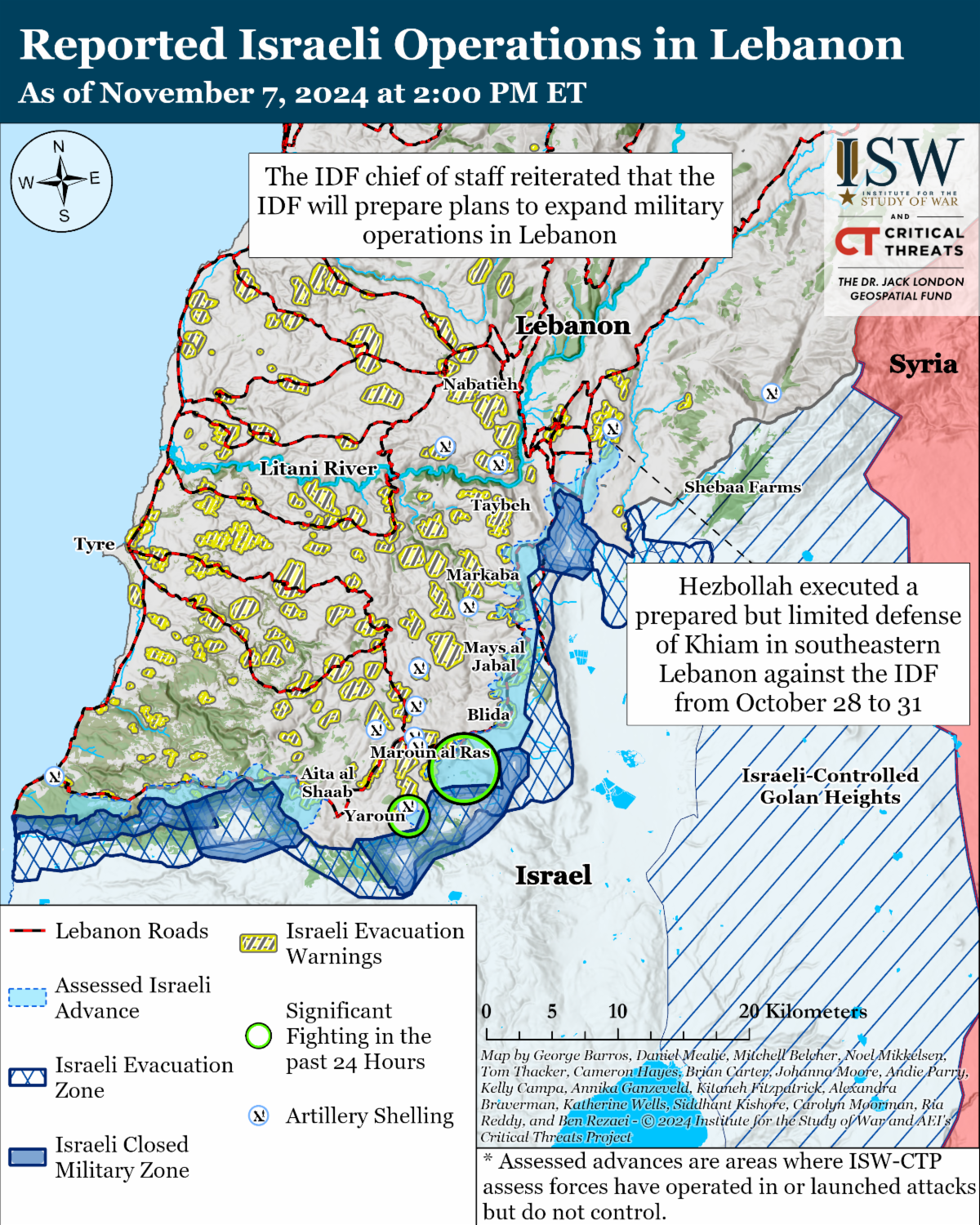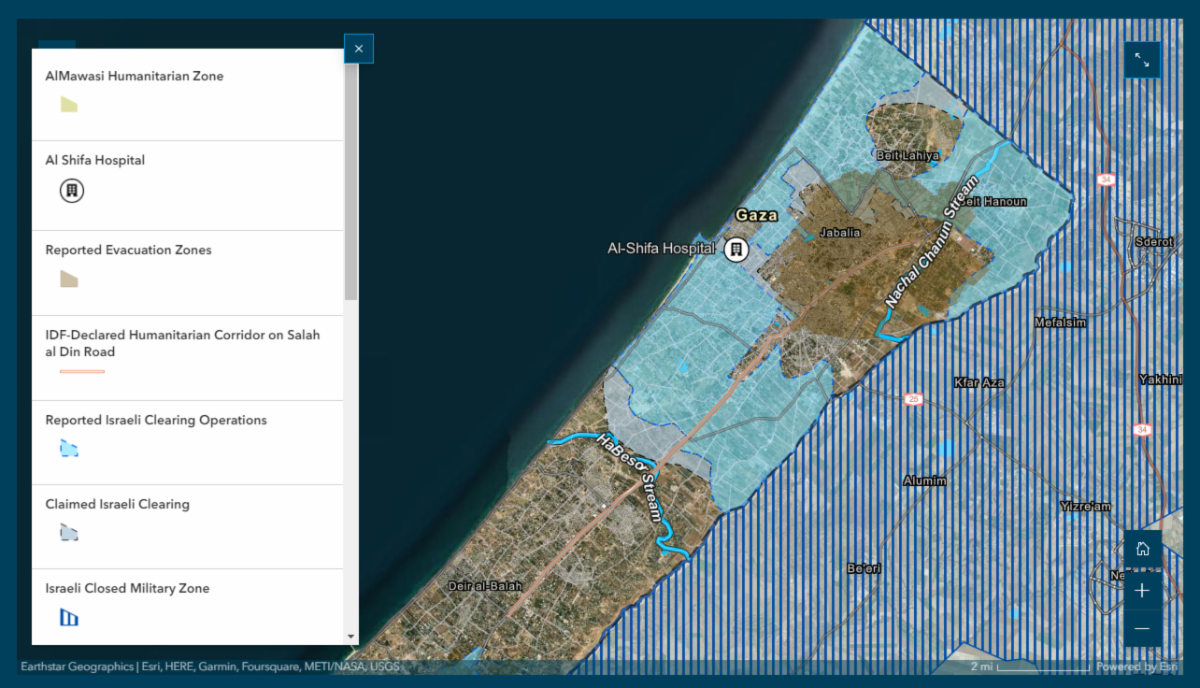Hezbollah executed a prepared but limited defense of Khiam in southeastern Lebanon against the Israeli Defense Forces (IDF) from October 28 to 31. Hezbollah’s Operations Room claimed that the group prevented an Israeli force from seizing and controlling terrain in Khiam by executing a “fire defense,“ which likely refers to a prepared but limited defense that involved pre-registering targets for indirect fire while committing only a small amount of infantry. This requires a certain level of preparation by Hezbollah but it is limited because a small amount of infantry could not hope to hold Khiam against an Israeli mechanized assault. Hezbollah fighters conducted 70 attacks over the IDF’s three-day advance towards Khiam. Most of these attacks were indirect fire attacks using rockets, thus supporting the theory that Hezbollah planned a defense centering on indirect fire. Hezbollah did not claim small arms engagements with Israeli forces during this period, suggesting that Hezbollah commanders used light infantry fighters sparingly, if at all. Lebanese sources reported small arms engagements between Hezbollah fighters and the IDF but did not specify at what range the engagements occurred. The low number of small arms engagements suggests that Hezbollah commanders were either unwilling or unable to deploy many infantrymen during the IDF advance into Khiam and preferred to deplete stocks of rockets, anti-tank guided missiles, and mortar shells.
Hezbollah’s prepared fire-heavy defense also suggests that Hezbollah commanders were focused on inflicting casualties rather than holding ground. This would be consistent with a defense that prioritizes the attrition of enemy forces and thus the enemy’s will to fight over holding ground. The IDF advanced at least five kilometers from Israel towards and into Khiam during the three-day operation. Hezbollah claimed that the IDF withdrew into northern Israel from Khiam on October 31 but did not provide additional evidence.
Hezbollah’s defense of Khiam has been the most organized defense of a southern Lebanon village since the IDF began its ground operation in Lebanon in early October. Hezbollah commanders may have chosen to defend this area given that Khiam is located on high ground from which Hezbollah could fire into northern Israel. Khiam, moreover, grants Hezbollah a vantage point from which it could observe Israeli forces and other targets around the Galilee Panhandle. The IDF never confirmed that it operated in Khiam and did not publicize Hezbollah equipment or infrastructure seized there. Geolocated footage posted on November 6 showed the IDF 8th Armored Brigade (res.) (91st Division) operating in Khiam in recent days, however. Israeli forces destroyed firing points aimed toward northern Israeli towns and located and destroyed weapons, including Kornet missiles, grenades, and explosives in Khiam. The IDF killed the commander of Hezbollah’s local unit in Khiam unit on November 3 after the IDF withdrew from the town. The IDF continued artillery shelling of Khiam and its outskirts post-withdrawal. The fact that Hezbollah’s tactical command echelons near Khiam managed to execute a defense is not a strong indicator that Hezbollah’s higher command echelons have recovered from the severe degradation caused by Israeli air and ground operations. The defense of Khiam could be planned and executed at a relatively low echelon of command.
Key Takeaways:
- Iranian Retaliation Against Israel: Recent statements by senior Islamic Revolutionary Guards Corps (IRGC) commanders suggest that the IRGC may conduct a direct attack on Israel from Iranian territory in response to the October 25 Israeli strike targeting Iran. Iran may conduct a smaller-scale direct attack on Israel than it did in April and October 2024 to preserve its diminishing long-range missile stockpile.
- Iran: Iranian Supreme Leader Ali Khamenei described the features a future supreme leader should embody during his first public meeting with the Assembly of Experts on November 7.
- Houthi Response to US Election: Houthi Supreme Leader Abdulmalik al Houthi stated on November 7 that the reelection of former US President Donald Trump does not impact the Houthis’ campaign against shipping or Israel. Abdulmalik said that Houthi fighters will continue to attack merchant vessels, US and Royal (UK) Navy vessels transiting through the Red Sea, and Israel itself.
| 





